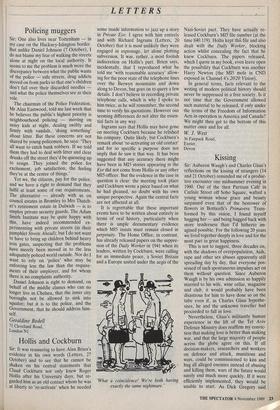Kissing
Sir: Auberon Waugh's and Charles Glass's reflections on the kissing of strangers (14 and 21 October) reminded me of a produc- tive encounter one midsummer evening in 1960. Out of the then Partisan Café in Carlisle Street off Soho Square, wafted a young woman whose grace and beauty surpassed even that of the bestower of flowers in Botticelli's Primavera. Trans- formed by this vision, I found myself hugging her — and being hugged back with more tenderness than I'd hitherto im- agined possible. For the following 20 years we lived together deeply in love and for the most part in great happiness.
This is not to suggest, three decades on, with the shadows of overpopulation, Aids, rape and other sex abuses apparently still spreading day by day, that everyone pos- sessed of such spontaneous impulses act on them without question. Since Auberon Waugh is by his own admission so happily married to his wife, wine cellar, magazine and club, it would probably have been disastrous for him to have done so on the tube even if, as Charles Glass hypothe- sises, he and the unknown traveller had proceeded to fall in love.
Nevertheless, Glass's militantly human experience in the lift of the Tel Aviv Defence Ministry does reaffirm my convic- tion that making love is better than making war, and that the large majority of people across the globe agree on this. If all decision-makers, researchers and workers on defence and attack, munitions and wars, could be commissioned to kiss and hug all alleged enemies instead of abusing and killing them, wars of the future would surely end much more quickly. If it were efficiently implemented, they would be unable to start. As Dick Gregory said
LETTERS
regarding the Vietnam War in 1966: 'When Christmas rolls along, you have a truce which proves that man can stop fighting. If he can stop fighting for Christmas, he ought to be able to stop for life.'
Michael Horovitz
Piedmont, Bisley, Stroud, Gloucestershire

















































 Previous page
Previous page